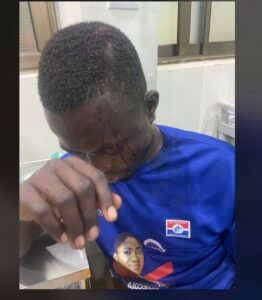
Blood sample with respiratory coronavirus positive
Agnes Bekoe
The novel coronavirus (COVID-19) has been declared a global pandemic by the World Health Organisation.
The virus outbreak has been a global health challenge faced in the 21st century, since its emergence in Asia late 2019.
The outbreak has had devastating effect on economic, social and political events worldwide and governments all over the globe have been moved to close down public gatherings in schools, churches, bars, restaurants and other social places.
The decision by governments worldwide to close schools, colleges and universities was to help reduce body contacts which is said to be a major means of spreading the virus and save lives.
Ghana, since it recorded its first two cases, has had more cases emerging and has now recorded over 8000 cases so far.
The government thought it wise to ban religious activities, funerals, all other public gatherings and shut down schools until further notice.
The closure of educational institutions in the country has caused major unequal interruption in students’ learning, disruptions in internal assessments, thus, the delay in preparations for external exams (WASSCE and BECE) and delay of university final year students’ completion. This disruption has been felt by many families in the country.
As the sages say, every challenge is an opportunity. Most institutions have resorted to the use of technology to engage their students as they stay home to stay safe.
Teaching, assessment and learning have been encouraged to move online.
The emergence of COVID-19 has brought the reality that technology in education can equally deliver great content and engage students and teachers.
Sustainable quality education
The Ministry of Education and Ghana Education Service launched a 24-hour free-to-air learning channel (Ghana Learning TV) dedicated to broadcast of educational materials for basic school and senior high school students.
A partnership between Multimedia Group and Wolo TV initiated an e-learning platform (Joy Learning) to help improve access to quality education for students at the senior high school level.
The tertiary institutions also have initiated virtual studies using digital learning platforms, Sakai, Moodle, Google Classroom and communication apps like Zoom, Skype, Microsoft team and WhatsApp.
These learning platforms have helped in engaging students in their stay-home and have also presented another reality in the Ghanaian educational system.
These, thus, bring us to the argument of implementing a policy that allows the use of smartphones and tablets in senior high schools, especially at the boarding house.
Arguments against the motion (permitting the use of smartphones in senior high school) is based on the fact that high school students may abuse these devices and will eventually lead to poor academic performance.
On the other hand, arguments for the motion is that when students are being educated during their first week orientation in school on how to use these devices to aid studies it will rather help and motivate students to stay connected to other students in different schools to share ideas, which will rather help improve research and academic communication.
Now, considering how students and teachers have been able to adapt to the technology of virtual learning in these times, I believe there will be a need to consider this decision of not approving the use of smart phones and tablets in senior high school.
With the right measures put in place, teachers, parents and guardians can supervise and be able to control what the students do on their phones.
Going with the motion of awarding boarders the privilege of keeping mobile phones during boarding hours, within the boarding house, all parties, including staff, pupils and parents, will need to take steps to ensure that these mobile phones are used responsibly.
Relief
A policy can be designed to ensure that potential issues involving mobile phones use can be clearly identified and addressed, ensuring that the benefits that mobile phones provide can continue to be enjoyed by boarders. Now, in order to ensure the appropriate use of these devices, the following measures are suggested:
- The decision to provide phones should be made and approved by the parents or guardians of the student to the school authorities.
- School staff, parents and guardians can supervise and restrict students by using parental control apps and content filtering apps such as FamilyTime, ESET, OurPactQustodio and FamiSafe.
- School WiFi can be controlled and limited to some websites which are helpful and also can be regulated to prevent unnecessary use during school hours.
- Mobile phones should be switched off and kept in the boarding house at all times during the school day. Students will be advised of allotted times at which they may use their phones with respect to the school’s schedules.
- Parents and guardians should not contact their child during the school day by way of the pupil’s mobile phone. In cases of emergency, the school office is the appropriate point of contact.
- Students will not be allowed to use social media apps or any inappropriate apps as there can be impromptu inspections and in the light of that platforms like Google Classroom, slack and other project and research communication apps like Microsoft teams can be used to permit communications among students nationwide.
Policies can be implemented to allow the use of smartphones and tablets in senior high schools, especially at the boarding house, if the above measures are considered. I am very convinced that the use of these devices can go a long way to assist students in their studies, as it will grant students the opportunity to carry out research, explore ideas and share resources with other students.
The writer is a student of the Ghana Institute of Journalism.








